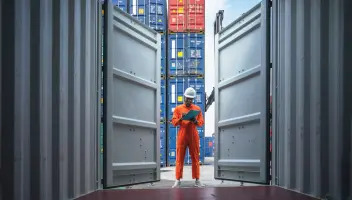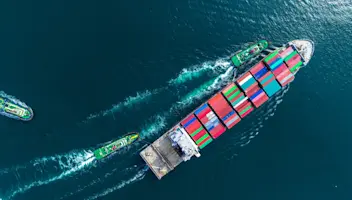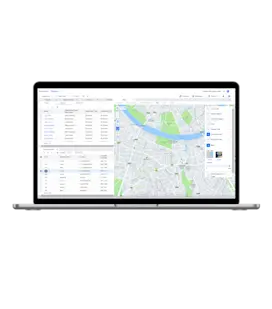Driving Towards a Greener Future: Sustainable Logistics With the Right TMS
Driving Towards a Greener Future: Sustainable Logistics With the Right TMS
Driving Towards a Greener Future: Sustainable Logistics With the Right TMS
1 Aug 2024
Aptean Staff Writer
These days, it seems everywhere we look there’s a call for “going green” or becoming “sustainable.”
And for good reason.
We live in an era where the health of our planet is more than just a banner or a catchphrase. It’s a beckoning for urgent action. Businesses are increasingly called upon by their end-consumers and regulatory bodies to redefine their operations to prioritize sustainability.
As the backbone of global commerce, logistics stands at a critical crossroads, with traditional transportation methods leaving deep carbon footprints.
Now is the time to steer towards greener horizons, and a transportation management system (TMS) is the compass that can guide you as you navigate this journey. In this blog we provide insight into sustainable logistic practices for businesses, highlight the capabilities of a TMS solution to drive greener practices and identify the cost-savings and environmental, social and governance (ESG) benefits of sustainable logistics.
The Imperative of Sustainable Logistics
Sustainability in logistics goes beyond operational efficiency—it’s about integrating eco-friendly practices into every link of the distribution supply chain. It's not just about reducing costs but about minimizing the ecological impact.
With environmental consciousness at the forefront of business priorities, a TMS emerges as a transformative solution—empowering you to seamlessly integrate sustainability into your daily routing and scheduling operations while tracking sustainability key performance indicators (KPIs).
TMS: The Path To Greener Practices
At the heart of a TMS are capabilities that can resonate with sustainability goals:
Route Optimization and Load Consolidation
It's a balancing act of logistics precision and environmental stewardship. By optimizing routes and consolidating loads, a TMS can help you significantly reduce emissions, ensuring that sustainability is a key driver, not just an afterthought. For instance, Pawling Corp saw a reduction in carbon emissions due to improved route planning and load management using Aptean TMS.
Optimizing routes and schedules reduces mileage, leading to lower fuel consumption and emissions. The advanced algorithms of a TMS solution can help create the most efficient routes, considering factors like traffic patterns, delivery windows and vehicle capacities. Additionally, load consolidation functionality helps ensure trucks are fully utilized and optimized for deliveries, minimizing the number of trips needed and further cutting down on emissions.
Mode Selection
With a TMS, you can navigate the complexities of choosing the right mode of transport. Whether it’s air, ocean, or ground, truckload (TL) or less than truckload (LTL), the right system can help you identify the most sustainable and cost effective option that aligns with your time frames and environmental objectives.
For instance, shifting from air to ocean freight for long-distance transport can significantly reduce carbon emissions. Additionally, combining multiple transportation modes into a single, optimized route can further enhance efficiency and sustainability.
Total Logistics Efficiency
Increased operational efficiency is a win-win for both your business and the environment. By minimizing waste and lowering energy consumption, a TMS aligns your logistical endeavors with green initiatives.
Total logistics efficiency encompasses more than just route planning. It includes warehouse management, inventory control and order fulfillment. A TMS can integrate with these systems to streamline the entire supply chain. For example, better inventory management reduces the need for expedited shipping, which often has a higher environmental impact.
Efficient warehouse operations, such as optimizing picking and packing processes, also contribute to reduced energy consumption and waste. Electronic bill of lading (BOL) reduces the amount of paper consumption ten-fold in your shipping and receiving departments and provides real-time visibility and accountability with e-signatures.
Visibility Is Vital
True sustainability is anchored in measurability. A TMS grants you the clarity to track, analyze and refine your supply chain processes, ensuring each step is aligned with your green goals.
Visibility into the supply chain allows for real-time monitoring and adjustments. This capability is crucial for identifying inefficiencies and implementing improvements. For instance, Aptean’s TMS provides analytics dashboards and reporting tools that highlight KPIs related to sustainability, such as fuel consumption, carbon emissions and route efficiency.
By continuously monitoring these metrics, companies can make data-driven decisions to further enhance their green initiatives.
Realizing the Cost-Saving Benefits
The benefits of embracing a TMS stretch beyond environmental impact; it’s also economically sound. Reducing fuel consumption through strategic route planning and streamlining operations cuts costs while safeguarding the environment. The dual benefit of a TMS shines through—profitability paired with planet-friendly practices.
Aptean TMS has saved companies over 86% on freight audit costs, ensuring not only environmental benefits but also significant financial savings. For example, automating freight audits eliminates manual errors and assumptions, which often lead to overpayments.
Additionally, by digitizing the BOL process, companies can save on printing costs and improve their environmental footprint by reducing paper use; which is not only great for improving your environmental footprint by reducing paper use, it also helps reduce your costs—with each sheet of paper costing approximately .05 cents the savings will soon add up.
Strengthening ESG Through TMS
Today’s consumers and investors are not just looking for products and profits—they’re seeking proof of sustainable practices. A TMS enhances your ESG profile by providing the data and insights needed for transparent and effective reporting.
This solidifies trust and supports the burgeoning demand for responsible business operations. With Aptean TMS, businesses can efficiently track and report their sustainability efforts, enhancing their ESG scores and attracting eco-conscious investors.
Charting a Greener Course With Aptean TMS
Integrating sustainable logistics into core business strategies is no longer optional. With Aptean TMS, your business gains the tools to maximize efficiency, optimize your operations and reduce costs while making measurable progress on your sustainability initiatives.
Aptean TMS facilitates collaboration and clear communications between shippers and carriers to ensure that all parties are aligned with sustainability goals and improving overall efficiency. This collaboration extends to sharing real-time data, which helps in making informed decisions that further environmental goals.
Are you ready to align your logistics with the needs of our environment? Let Aptean TMS guide you to a more sustainable, efficient and resilient supply chain. Discover the difference it can make for your business—contact us for more information or request a personalized demo today.
Related Content





Bent u klaar om uw bedrijf radicaal te veranderen?
We hebben gespecialiseerde TMS-oplossingen waarmee u elke uitdaging in uw branche aankunt.



